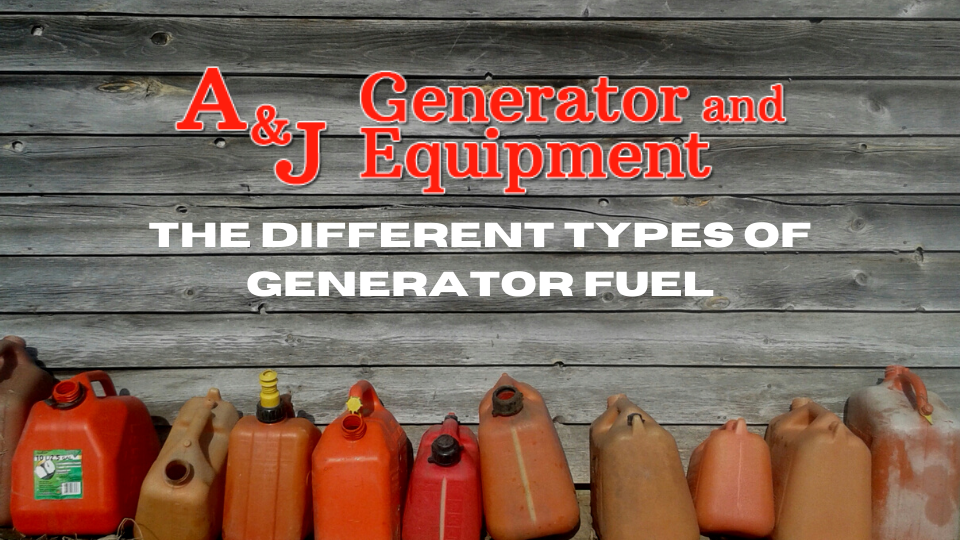
A whole home generator is one of the most important appliances that you can have for your home. During a power outage, your generator will be what saves you and your family from being without electricity. As there are a lot of different types of generators available on the market, it is important to research and purchase the best unit for your wants and needs.
Generators can use several kinds of fuel, including biodiesel, propane, diesel, or gas. As each type of generator fuel has its benefits and drawbacks, in this blog we will compare these different types of fuel so you can select the best generator for your home.
Select Your Generator Fuel Type
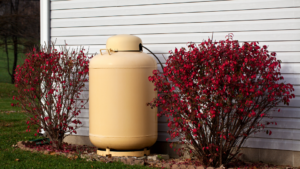
Gasoline
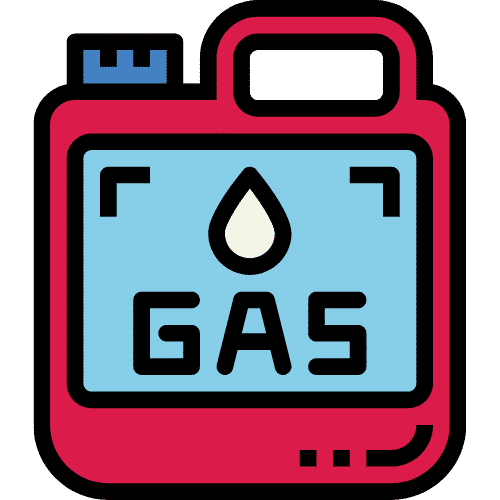
This is one of the most common fuel types used in generators because gas is a type of energy resource that can be easily obtained. You don't need to worry about running out of gas as you can always purchase more at your local gas station.
Like any fuel option, there are some disadvantages to be aware of as well. Gas is a highly flammable product, so you must always be careful handling it. This also means it is unsafe for you to keep high volumes of gas in storage. Keeping large quantities of gas can be extremely hazardous. Gas also consists of a more expensive type of fuel. Though this fluctuates, always check your local gas prices before buying a gas-fueled generator.
Pros:
- Gas generators are fairly quiet. This would make them a great option for smaller homes with little to no sound installation. If you are a light sleeper, gas generators may also be a good option to prevent losing sleep.
- Gas-fueled generators are very reliable. Gas is something you can get any time, therefore you can power your generator whenever you may need it.
Cons:
- Prices of gas change daily. Some days it could be very cheap to purchase gas to run your generator while other days it could be extremely expensive. Be aware of the fluctuating gas prices.
- Gas-powered generators tend to consume fuel at a higher rate than other types of fuel. This means you will have to add gas sooner than you would a diesel generator.
- Gas is hazardous. You must be careful handling gas because it is flammable.
- Generators fueled by gas might require more maintenance than other fuel types as gas burns at a higher intensity.
Eco Facts on Gas:
One positive effect of gas in the environment is it is fairly clean compared to other fuel sources for your generator. This is because gas burns in a way that is cleaner than other fuels. It produces fewer emissions overall and is considered pretty environmentally friendly compared to its counterpart fuels. One thing that should be considered is gas is toxic and flammable, which contributes to air pollution. Always be careful when handling gas.
Best Gas Generators:
- Briggs & Stratton 12,000-Watt Automatic Air Cooled Standby Generator
- Briggs and Stratton 20kW Standby Generator
- Generac 20kW Standby Generator
Propane
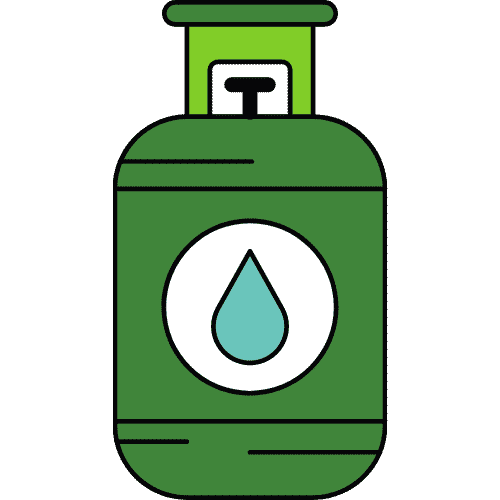
This is another common fuel type that is used in many whole-home standby generators. Propane is commonly used because it provides a clean-burning process in the generators. It is also easy for you to store this fuel in small or large storage tanks. Propane generators are preferable among homeowners as they are typically a quiet system.
Though propane has all of these benefits, it is important to be aware of the risks involved with using propane generators regularly. Propane generators tend to have a complicated fuel system. This increases the risk of the generator failing. Propane can also be dangerous if parts inside the generator become broken or damaged.
Pros:
- Propane is more eco-friendly than gasoline or other types of fuel used in generators. This means they release less CO2 emissions.
- Propane has no expiration date.
- Unlike gas, propane generators tend to be much quieter.
Cons:
- Propane-fueled generators tend to be more expensive because if you have a large enough system it can power your entire home in an emergency, including your HVAC system. Other types of fuel might not be able to power everything in your home.
- They can be a little more complicated to repair because propane burns differently than other types of fuel.
- Though propane is more eco-friendly than gasoline, it is overall less efficient.
Eco Facts About Propane:
Propane is another popular fuel choice among generator users. Propane is eco-friendly in the way that emits a fairly lower level of carbon dioxide compared to other fuel sources. It also does not emit sulfur dioxide. Lastly, propane when burnt will not contaminate local sources of groundwater or any other agriculture as it is non-toxic.
Best Propane Generators:
- Briggs and Stratton 26kW Standby Generator
- Briggs and Stratton 20kW Standby Generator
- Guardian 20,000-Watt (LP) / 18,000-Watt (NG) Air-Cooled Whole House Generator with Wi-Fi and 200-Amp Transfer Switch
Diesel
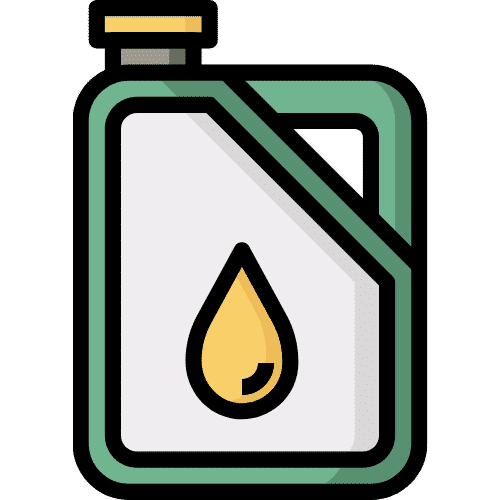
Diesel is another common fuel type that is used in many standby generators. This fuel source is preferable because it is considered the least flammable fuel source. Diesel fuel is very easy to obtain during a disaster, as it is a common fuel also used in the trucking industry, farming operations, and the military. Most diesel engines can last or more than 10,000 hours. As diesel is extremely durable, many people utilize it to use in their whole-home generator.
When comparing diesel to gasoline, people sometimes avoid diesel because it tends to be noisier than other types of fuel engines. If you are considering any type of diesel-powered engine, you should choose one with an enclosed generator system to eliminate the noisy sounds. You should also be aware in certain states there are limitations to how long you can use your diesel engines to reduce the amount of pollution it creates.
Pros:
- Diesel generators tend to be very safe and reliable. This is due to the fact the engines have a significantly lower temperature output than other fuel types. They also use compression rather than spark plugs to ignite, meaning there is less stress on the engine and the chance of it malfunctioning.
- They are very fuel-efficient. Some diesel engines require only half the amount of fuel needed than gasoline engines would use.
- They are much easier to start in colder weather conditions.
Cons:
- They tend to be more expensive than other types of generators. This includes any parts needed to fix the engine if it were to break.
- Diesel fuel creates a lot of pollution, some states even have regulations as to how long you can run it for.
Eco Facts About Diesel:
Diesel fuel is eco-friendly in the sense that it emits much less carbon dioxide than gasoline. They are also much more efficient than gasoline engines, meaning they will conserve fuel rather than burn through their fuel source at an extremely high rate. One disadvantage of diesel is that if run too long, it could contribute to ground-level ozone which would damage surrounding agriculture. Just always be aware of how long you are running your diesel generator.
Best Diesel Generators:
- Bluestar Diesel 30kW Standby Generator
- Blue Star Diesel 60kW Standby Generator
- 30 kW, 60 Hz, Liquid-Cooled Protector Series Standby Generator, Aluminum Enclosure
Biodiesel
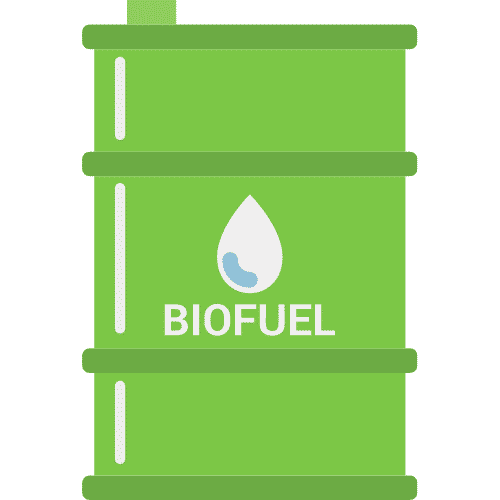
The last type of common generator fuel is biodiesel. This fuel is popular among many homeowners because it is considered to be the least flammable fuel source on the market. It is very easy to find biodiesel. This fuel is made from natural and renewable resources, such as natural animal fats or vegetable oils.
As most biodiesel generators usually have a large storage tank, you will need ample space to install your biodiesel fuel generator. You also need to mix the right percentage of oils or fuel when you use this fuel for powering your generators.
Pros:
- The most eco-friendly fuel source for generators as it releases the least amount of emissions.
- Biodiesel is a renewable energy source.
- This fuel is very safe, it is much less toxic than other sources of fuel.
Cons:
- In colder temperatures, this type of fuel can change consistencies and almost turn into a gel-like substance. You cannot use biodiesel fuel in cold temperatures.
- It tends to clog. This puts your generator at more risk of malfunctioning.
- It is more expensive than other types of fuel as well as less efficient.
Eco Facts About Biodiesel:
Biodiesel is eco-friendly as it is both biodegradable and nontoxic. This reduces the risk of global warming as it emits much fewer emissions than other sources of fuel. Biodiesel is also fairly energy efficient.
Want to know how much propane a standby generator uses? Learn more here.
Let the Generator Experts at A&J Generator Suggest Your Next Fuel Type!
Above are some common generator fuel types that are used by many generators today. If you are struggling to choose both a generator and a fuel type that will work best for you, consult with our generator experts here at A&J Generator and Equipment. Our professionals have tons of experience and knowledge to help you choose the best system for your home or business. We will recommend the best generator for you!
